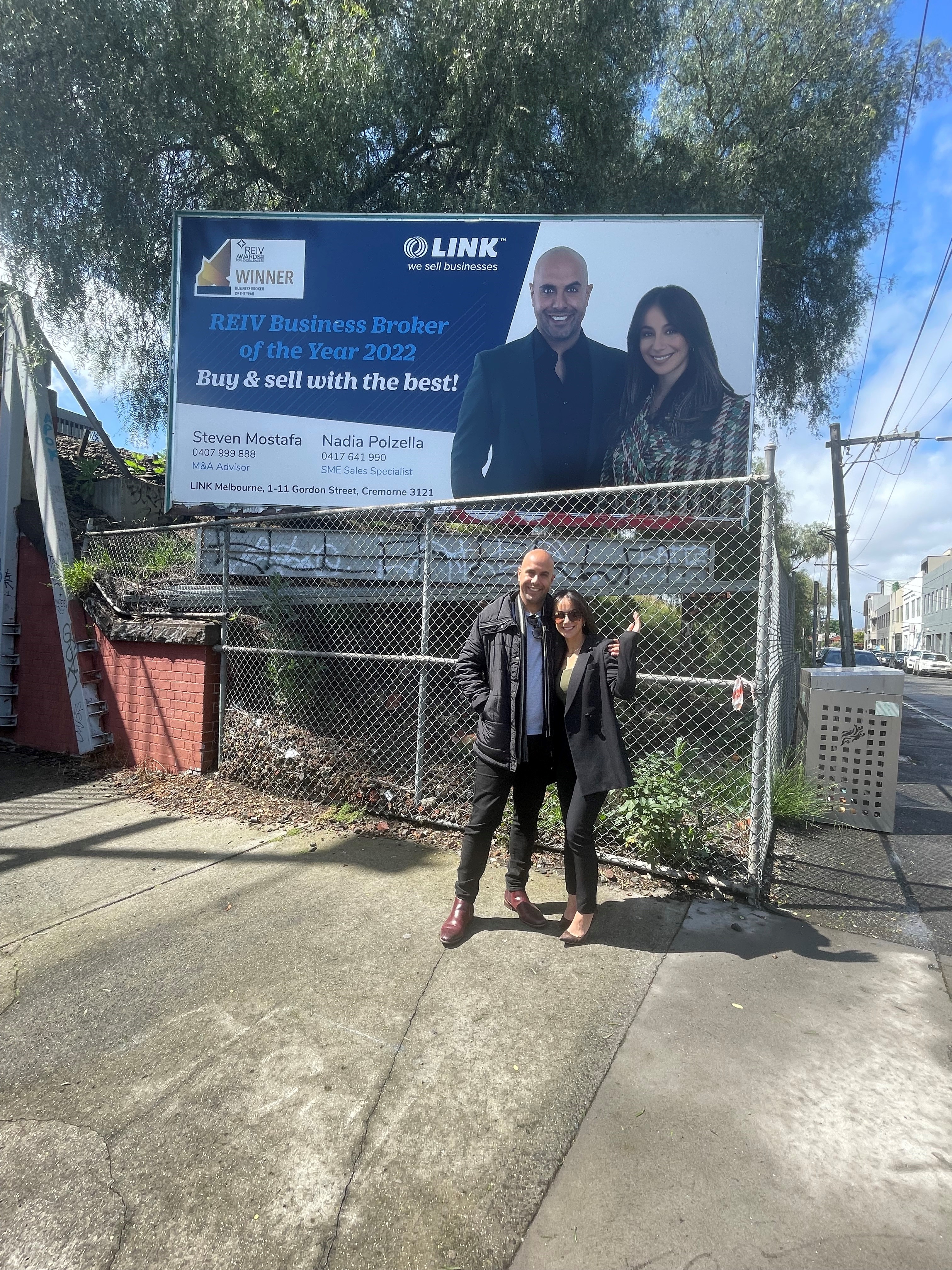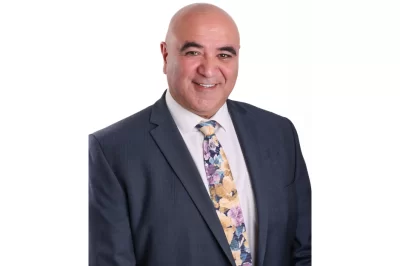Powerhouse Partnership: Dynamic Duo Sets New Standards as Business Brokers

Powerhouse Partnership: Dynamic Duo Sets New Standards as Business Brokers
Are two heads better than one?
“Absolutely!” say Steven Mostafa and Nadia Polzella of LINK Business Brokers in Melbourne. This multi-award-winning team has worked together since 2020, but their paths to becoming business brokers were vastly different.
Steven was a foreman in the construction industry before transitioning to successful ownership of several hospitality businesses in Melbourne. He saw first-hand the value a business broker could add to the purchase or sale of a business, so when the opportunity presented itself, he happily joined the industry.
“Brokers from Klemms (the forerunner to LINK Melbourne) sold a few businesses I worked in, so I knew what a switched-on broker could do. That’s what got me into the industry.”
Having graduated from Deakin University with degrees in Commerce and Property & Real Estate, Nadia joined the operations side of Klemms, utilising her strengths in finance and accounting.
Nadia explained her transition, “After a few years, I decided to make the switch to sales. Steven approached me to work with him, and we haven’t looked back since. Steven had the experience of working by himself, and he had the vision of building an effective team. So I signed on, knowing I would be part of that vision.”
SO, WHY OPERATE AS A TEAM?
This dynamic duo has a solid understanding of the business acquisition process and all parties involved. Leveraging the synergy of two expert business brokers working seamlessly together significantly enhances the potential to secure an optimal sale price and facilitate a seamless transaction.
“Our different skills and experience definitely complement each other. We can bounce ideas off each other, knowing we are heading in the same direction,” commented Nadia.
“Having two sets of eyes observing the interactions at meetings is often also an advantage,” added Steven.
With numerous parties involved in an acquisition on both sides of the table, having two brokers advocating for the vendor can be advantageous.
DO YOU HAVE IDEAL CLIENTS?
This team operates in the LINK corporate division, so the focus is on businesses in the $20 to $100 million range. However, Steven explained, “Everyday transactions for us would be $3 to $50 million.”
Utilising his network, Steven is most interested in construction, manufacturing (particularly furniture), and food distribution. Meanwhile, Nadia concentrates on hospitality and e-commerce with a broader focus on beauty and retail - “the more intricate businesses” as Steven describes them.
The motto ‘two heads are better than one’ definitely comes into play when considering different types of businesses. Working together and openly discussing the sales process allows this dynamic duo to execute highly effective strategies for their clients - no matter what industry.
WHAT ABOUT IDEAL BUYERS?
They both agreed that matching potential buyers to the right businesses is valuable for long-term success as a business broker.
Today’s delighted buyer is potentially a seller in the future, so creating a professional relationship now may lead to additional business opportunities.
Nadia explained, “ We like to have a limit on the number of listings at any time because we want to look after our clients (both sellers and buyers) appropriately. We know exactly what kind of buyer is likely to succeed in that business. But, if it’s not a good fit, we explain why and point the buyer to a listing that better suits their requirements.”
She continued, “It would be unethical if we were to advise someone to buy a business that is unsuitable for them. If we don’t believe they have the hunger for that business, we will still help but not with that business.”
HOW DO YOU MANAGE THE NEGOTIATION PROCESS?

Steven and Nadia quickly acknowledge that negotiation skills are critical for all business brokers.
Steven elaborated, “We have worked hard to build a process to ensure buyers and sellers know what to expect. We are excellent at setting price expectations before introducing potential buyers to our seller clients. When we manage both parties’ expectations, difficult negotiations are rare.”
“Those expectations are established at the first meeting,“ added Nadia. “Constant communication and complete transparency also help to reinforce the expectations we set initially.”
While managing expectations goes a long way to avoiding lengthy negotiations, the inevitable differences still occur.
Nadia explained their approach, “Something that works well for us is to get both sides to meet face-to-face to reach an agreement. We find that parties can be as tough as they want by email or via third parties. But agreement is easier to achieve when they are talking directly and can see the other person’s emotions and hear their natural language. We are all humans after all.”
Steven agreed, “Yes, we have just adopted a policy of a compulsory face-to-face meeting if we go back and forth with the solicitors three times on the same issue. Of course, the meeting can be electronic (we use Facetime frequently), but the key is that everyone can see each other. It’s a lot harder to say ‘No’ when you are looking someone in the eyes.”

And those expectations are helpful when a buyer makes an unrealistically low offer. Steven described it this way, “If a buyer says ‘I’ll offer $600,’ we’ll set the benchmark by replying that we are not taking any offers below $700 to the vendor and encouraging them to reconsider. We have done the research to establish a fair price range, so the offer must be in that range to be considered.”
WHAT ARE THE KEY STRUGGLES SELLING A BUSINESS?
The fast pace of change in the business world creates uncertainties for both sellers and buyers, and Steven believes that false expectations can be a struggle, particularly for vendors. “A vendor may have a price expectation based on an appraisal from three or four years ago. The reality is that market and economic factors will change in that time, and what may have been a reasonable expectation then is unrealistic now.”
Nadia nominated poor presentation as a related impediment to a successful sale. “Are the financials and any other documentation readily available and supportive of the asking price? If buyers have to go through a frustrating process of requesting and waiting for information, they will often get cold feet and move on to other opportunities.”
Steven explained their approach to presentation, which has been developed to address these struggles. “We take a long time before we list a business for sale. We are extremely thorough when collecting information. We do not list the business until we have verified financials, memorandums, videos, and any other information ready for a potential buyer.”
Ideally, Steven and Nadia start working with a business two or three years before a sale. During that time, they complete a financial health check annually to update price expectations and to give the business owner advice on ways to improve profitability and processes to increase the value of the business.
They have developed an extensive library of templates and checklists to streamline the health check process and to guide the business owner regarding the materials needed to support the sale.
“This means that by the time the owner wants to sell, we know the business inside out, the owner has reasonable price expectations, and the presentation of the business for sale will be impressive. All of this leads to a smoother sales process,” concluded Nadia.

HOW IS THE CURRENT BUSINESS SALES MARKET?
According to Steven and Nadia, the unusual economic conditions are having an impact on transactions. Steven commented, “Deals are still ticking along and thriving in some sectors, but they take longer to complete. Finance now takes up to twelve weeks instead of six. Overall, people are being more diligent, which takes time to work through.”
Nadia agreed, adding, “For hospitality businesses, finding and securing a buyer is a lot slower, but for other industries, it’s mainly the slow completion process Steven referred to.”
AND, WHAT ABOUT THE FUTURE?
This dynamic duo continues to be busy matching buyers and sellers to ensure everyone wins. Exiting a business is a normal part of the business cycle, and although businesses (and industries) thrive and fade, the need for business owners to sell and the desire for buyers to purchase their dream business will continue.
Steven’s final advice to potential sellers is, “Book us early. We want to work with business owners well before the final transaction to make sure we can achieve the best outcome.”
Tags: business broker selling acquisition small business coaching feature magazine
About the author










